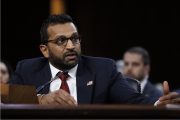
“The Russian government has engaged in espionage against Americans,” hacking “American websites, American accounts of private people, of institutions … in an effort, as 17 of our intelligence agencies have confirmed, to influence our election,” Democratic Party presidential nominee Hillary Clinton told Chris Wallace of Fox News in the third and final debate before the November election.
But Wallace did not even ask about who hacked her e-mails, some of which have been made publicly available by WikiLeaks. Wallace asked Clinton about a private speech she had delivered to bankers in Brazil, in which she said she dreamed of “open borders” throughout the Western Hemisphere. But because Wallace had noted that the source was WikiLeaks, Clinton chose to discuss how the information had been obtained, rather than her shocking statement that she wants America’s borders to be open to any person in the Western Hemisphere who desires to come to the United States.
Of course, that would most likely include the majority of the population of North and South America. Certainly it would be millions of immigrants, at the very least.
Donald Trump countered Clinton’s bold claim that Russians hacked her e-mails, saying that she “has no idea whether it’s Russia, China, or anybody else.”
In rebuttal, Clinton simply repeated her claim, and chastised Trump for even questioning the integrity of U.S. intelligence officials who have taken an oath to defend the country.
Let us assume, for the sake of argument, that the hacks were perpetrated by the Russian government, or at least that there was strong evidence for such. Should the Obama administration be announcing this to the general public? However, considering that the White House has demonstrated so little concern for the well-being of the United States, it is not surprising that Obama would opt to reveal this information less than a month before the election — an action designed to help the candidate of his political party.
Of course, Clinton defended U.S. intelligence agencies as above politics. But the reality is that politics has clearly played a role in some decisions of intelligence agencies, such as in 2012, when the CIA interjected itself in the last political campaign by creating Benghazi talking points. And then there was the distortion of analysis on ISIS and Syria by SOUTHCOM — the U.S. Southern Command, responsible for all military activities in South America and Central America — which conformed to Obama’s foreign policy position.
If the Russians were able to hack into Clinton’s e-mails when she was secretary of state, because she was so careless (at best) as to use a private e-mail server, then does that not offer a reason that she should have been indicted?
Hillary did not tell the truth when she claimed that 17 intelligence agencies had determined the Russians were responsible for the hacking. Only two agencies — the Department of Homeland Security (DHS) and the Office of the Director of National Intelligence (DNI) — have even addressed this issue, and their conclusion is somewhat different from Hillary’s interpretation of it. The joint statement by DHS and DNI was that the hacks are consistent with the methods and motivations of Russian-directed efforts, with the presumed intention to interfere with the election process in the United States.
Certainly, the Russians have a history of interfering in the internal affairs of other nations — the KGB and other Soviet agencies regularly used disinformation to plant stories in the Western media. And, of course, Russian President Vladimir Putin, who was a high-ranking KGB agent during the Cold War, has publicly stated that he would like to see the restoration of the Russian Empire of the Soviet Era.
But all that does not prove Russia had anything to do with this specific hack.
The accusation conforms with the narrative that the Clinton campaign has been spouting for the past few months: that Putin prefers Trump over Clinton. Perhaps. Perhaps not. Again, it is interesting that when it was clear that Soviet dictators preferred someone other than Ronald Reagan as president, the Democrats did not consider that a reason to vote for Reagan. Rather, they argued that the United States should “deal” with Brezhnev, Chernenko, Adropov, and Gorbachev, and were highly critical when Reagan did not do so in the early years of his presidency.
Clinton herself vowed to have a “reset” on relations with Putin and Russia when she became secretary of state; however, relations have clearly deteriorated with Russia since she and Obama took over American foreign policy.
Others do not buy the Russian-hacker theory, anyway. Willliam Binney, a former high-ranking intelligence officer with the National Security Agency, recently told radio host Aaron Klein that he believed it is more likely it was a “disgruntled U.S. intelligence worker” who is responsible. Binney even argued that the FBI has long had access to the database of the NSA, and because of that, “if the FBI really wanted [the e-mails of Clinton], they can go into that database and get them right now.” He insisted that the NSA has all of Clinton’s e-mails, including the deleted correspondence.
Judge Andrew Napolitano, speaking on Fox Business’s Judge Napolitano’s Chambers, challenged the Clinton assertions, declaring bluntly, “the Russians had nothing to do with it.”
The entire discussion of the role of the Russians in passing the information on to WikiLeaks is a diversion from the startling statement Clinton made to Brazilian bankers: that she wants no borders in the Western Hemisphere. This means that it is highly likely that a President Hillary Clinton will follow the pattern of President Barack Obama, who has regularly ignored laws, such as those concerning immigration, with which he does not agree.
So, the entire discussion of whether WikiLeaks obtained its information from the Russians or someone else is important, but if Hillary Clinton’s “dream” of a borderless Western Hemisphere were to come true, no one would have much motivation to hack into the e-mail of an American secretary of state. After all, how long could the United States continue to exist, in any meaningful way, without borders?


